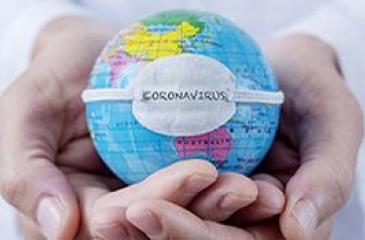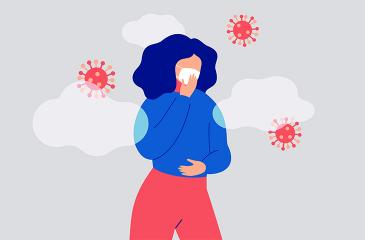In 2019, Michael Metcalf, Colton Cannon, and Dale Krageschmidt completed a group project as part of the Summer Public Health Institute’s course, “Emerging and Re-emerging Infectious Diseases,” where they learned about Ebola, SARS, and MERS. Nearly a year later, their lives have been heavily impacted by the new emerging disease: SARS-CoV-2, also known as COVID-19. Fortunately, they put their learning experience to practical use and worked together the last few weeks to develop a simple COVID-19 educational module that can benefit others.
Metcalf is an MPH student in the Executive Public Health Administration and Policy online program in the School of Public Health. He took a week off work last year to take the summer course.
“Every day was filled with exciting content provided by instructors who have real world experiences from all over,” said Metcalf. “A major focus of the class was understanding how infectious diseases spread, and how to plan containment strategies for these diseases.”
Students formed small teams to focus on one specific disease and plan containment strategies and recommendations. The group selected MERS-CoV or Middle East respiratory syndrome-related coronavirus, a coronavirus disease similar to COVID-19.
“We analyzed various aspects of the disease, and I had the opportunity to think critically about infectious diseases and the scope in which they exist,” said Cannon, a DDS/MPH candidate in the School of Dentistry and School of Public Health.
Cannon explains, “The project gave me insight into the strategies of effective public health prevention and policy: how we can learn from others, not make the same mistake twice, and effectively educate and enact decisions to prevent the spread of disease.”
Metcalf works with the Wisconsin Department of Health and is now assisting with the COVID-19 response.
“In my role, I find myself helping with the guidance creation process and the dissemination of communication to statewide partners,” said Metcalf. “Looking back, it is remarkable to see the containment strategies we suggested for our group project, and how similar they are to the current COVID-19 pandemic. And to now be able to help curb the infectious disease has been very rewarding.”
Krageschmidt, PhD, is a retired Mayo Clinic director and current professor of health care leadership at Viterbo University. He has returned to the Public Health Institute off and on since 2002 to keep abreast of current events in public health.
“As an old timer, I really enjoyed working with two brilliant young professionals,” said Krageschmidt.
Rising to the Occasion
Given the similarities between the group project and the current pandemic, their instructor, Carolyn Porta, PhD, MPH, AVP for clinical affairs, reached out to the team to see if they would be interested in applying their knowledge to COVID-19.
“When I went back to the work this team had done on a presentation about MERS, I knew that if they were willing, they could create a valuable comparison with COVID-19 that students, faculty, and the general public could learn from,” said Porta. “They stepped up immediately and the final product is fabulous.”
The team decided to create a module including a recorded presentation, the slide deck, suggested readings, and reflective questions that people can use to better understand coronaviruses.
“There are many lessons we can learn from previous outbreaks to more effectively react to our current pandemic,” said Metcalf. “This project and the module can be used in future classes or seminars. It is also a good example of learning that extends beyond the classroom. It's been almost a year since we took the class and here we are, still diving into this topic.”
This module can be used by students, faculty, health care workers, and the greater public.
“The toolkit can help people better understand what a coronavirus is, where they come from, and what we can do to reduce their transmission,” said Metcalf. “With so much misinformation out there right now, it is important to share this knowledge.”
As budding health professionals, Metcalf and Cannon are prepared to meet the needs of our current pandemic with creative solutions. Krageschmidt was a coordinator for emergency preparedness and hospital incident command system programs while at Mayo. He has been using that experience to help small hospitals and nursing homes in the Midwest with their preparedness and personal protective equipment plans for the current pandemic.
“The greatest outcome of this class for me has been the ability to take my education and apply it directly to a real-world pandemic involving an infectious disease,” said Metcalf. “I am seeing how my education is, and has been, helping me become a public health professional. I see time and again that I can apply what I am learning into the field of public health.”
Cannon explains, “The skills and abilities I learned gave me tremendous insight into our current situation. As a future health care professional, I learned to look beyond the disease and evaluate the circumstances in which it evolves.”
The Summer Public Health Institute at the U of M School of Public Health is a space where public health innovation and critical learning happens. Participants can build or expand their professional expertise, learn best practices, broaden career options, network with other professionals, or explore a new area of interest. Most courses span one week and provide participants with applied research and practice that can be used right away.



